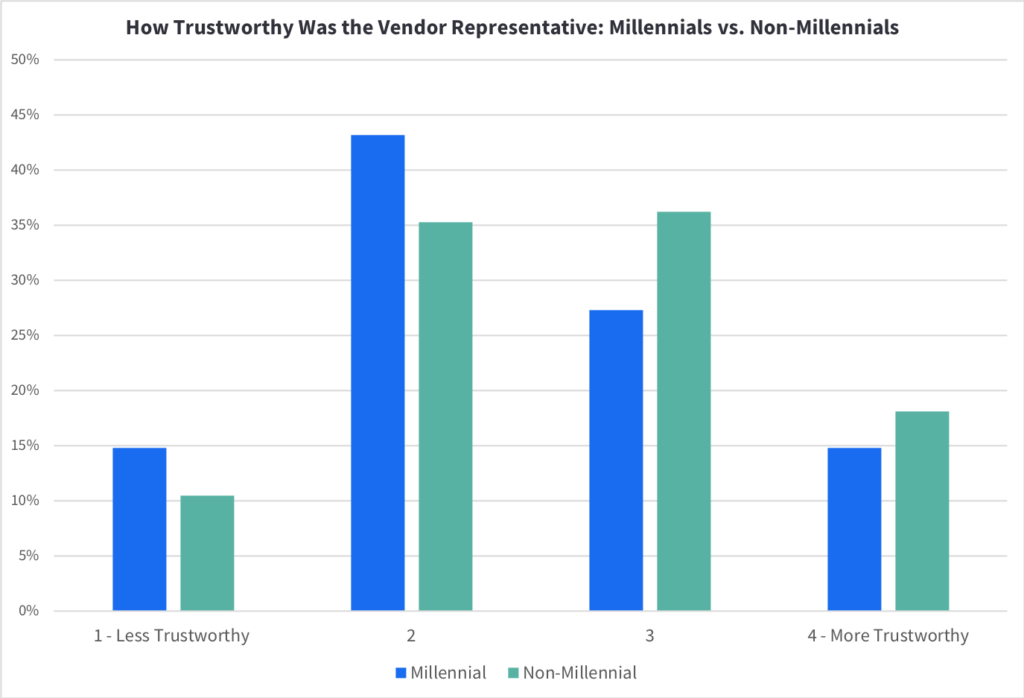Millennials: The New Decision Makers in B2B Software
Millennials are used to being considered the ‘others.’ They have negatively been seen as self-absorbed and entitled from older generations.
Why?
We do things differently than older generations, we think differently, and we were shaped differently.
But the fact is we are no longer the “others” in the workplace. We are the ones driving business and consumer behavior. We are the up-and-coming executives, experienced developers, and buyers. Lastly, we are the driving force of growing businesses.
One key trait of millennials is that they love sharing and reading (or watching) others’ opinions.
Millennials publicize their opinions on everything. Their thoughts on coffee shops, travel spots, politics, customer experiences, and favorite products are all on public display on the Internet–a medium millennials grew up with. In turn, they appreciate the opinions of others and engage with others before coming to a conclusion. They use public forums, social media, and review sites to interact with the world around them and make informed decisions.
This is true not only of experiences and preferences in millennials’ personal lives but also in their professional lives. Millennials use these same online avenues to give and receive career advice, job offers, feedback about employers and company culture, and feedback about the software tools and service providers they use at work.
73% of millennials who work in business are involved in the technology purchasing process for their companies. If you’re a B2B software vendor, it is crucial to understand their perspective on what their process is for buying solutions and what they look for when buying technological products.
Who are Millennials?
When you think of millennials, you probably picture that young 20-something person glued to their computer screen at your local coffee shop. You might even picture them with messy hair or activewear on. Well, you might not be wrong. They might be working at a coffee shop and they might be underdressed for a traditional office, but that does not mean that they do not carry influence in the workplace. It’s also a far too limited view of what it means to be a millennial.
Millennials are now in the 22-37 age range, according to the Pew Research Center’s definition. This group ranges from the young college graduate to the professional who has about 15 years of working experience. So that 20-something you were thinking of would be accurate, but your 35-year-old coworker with two kids and a mortgage would also be an accurate description as well.
They have a unique relationship with technology because their childhood development paralleled the development of many popular digital technologies that shape our modern world.
When they were young children, they may or may not have had a desktop computer in their home. If they did, it was dial-up. (Anyone remember the awful AOL dial tone?) In middle school, many remember instant messaging but did not yet have their Facebook accounts and barely heard about Google, which they now have had for at least a third of their life.
Millennials were young children when computers and the World Wide Web were in its early years. Now, they are professionals embracing their favorite SaaS products.
They weren’t born into a world with technology all around them, but instead, they grew as technology flourished. Because of this, millennials natively know how to use technology, adapt as it adapts, and remain open to new possibilities.
Purchasing Power of Millennials
Millennials make up more than a third of the workforce. They’re the largest generation in the workforce right now, in fact. Many of these millennials enjoy working remotely, value work-life balance and check their email while not in the office.
They are known for job hopping until they find the right career fit, understanding the advantages and risks of automation, and expecting technological advances at work.
Many of them work in businesses seeking out SaaS products. In the recent TrustRadius B2B Buying Disconnect research study, over 45% of the 430 B2B technology buyers surveyed were millennials. That is the most of any age group looking into B2B products and services.
Millennials have a significant impact when considering what technology to incorporate in their businesses. This is due to the combination of their age and work experience, their comfort with technology, and their willingness to try new products.
In short, millennials have significant B2B buying power. It’s important to understand their point of view when it comes to buying if you’re planning on selling to them.
What do Millennials Want in the Buying Process
Long story short, millennials love learning from each other and contributing to the conversation. More than half of millennial buyers use reviews when making a business technology purchasing decision (much more than other generations). More importantly, they feel that reviews are much more trustworthy than other marketing collateral.
But why is that?
Younger generations do not trust vendor marketers and sales representatives. They think critically about the sales rep’s motivations and believe that the vendor’s main goal in their interactions is to sell the product. Though other generations acknowledge this too, millennials are more likely to place more trust in their own research.
Their main sources of research are watching product demos, analyzing user reviews, using free trials, and examining the product’s website. Product websites are not considered a very reliable source to get the whole story about a product but are valuable when supplemented with other sources that aren’t controlled by the vendor.
Millennials vs. Your Sales Rep
Millennial buyers prefer not to talk to vendor representatives until later into the buying process and for specific, often pragmatic, purposes. When millennials interact with sales reps they already know the product. They’ve done their research and are looking for final answers and pricing options. They respect and appreciate vendors who are open and honest. If the vendor is not transparent with the product’s limitations or weaknesses, this will be a red flag to young buyers. They do not want dazzling language and catchy buzzwords. They want truth.
 This may require doing things a little differently than usual, with more radical honesty. Right now vendors aren’t meeting buyer expectations. Only 37% of buyers believe that vendors are honest about their product’s limitations even though 85% of vendors believe that they are being transparent.
This may require doing things a little differently than usual, with more radical honesty. Right now vendors aren’t meeting buyer expectations. Only 37% of buyers believe that vendors are honest about their product’s limitations even though 85% of vendors believe that they are being transparent.
Though all buyers show distrust of vendors, millennials consistently show less trust in the vendor than other generations. This distrust, paired with millennial comfort and competency with online research and communication, change how millennials interact with sales representatives–how they prepare for negotiations, and the level of honesty and expertise they expect to get in return.
The millennials distrust of sales and marketing teams, need for transparency, and sense of self-reliance for research have all contributed to a shifting buying process. The new buyer’s journey, especially when millennial buyers are behind the wheel, is highly centered around reviews, free trials, extensive online research, and limited conversation with the vendor.
Key Takeaway to be a Strong Partner in the Millennial Buying Process
One word sums up what the millennial buyer is seeking: trust.
Trust is the hard-earned product of transparency, research, engagement, trials, and consistent branding. All buyers, millennials, in particular, want to trust a company before committing to its services.
It is challenging to win millennial trust. That is why the trust of a millennial is so valuable. But once it is earned, that trust will be shared with the rest of the business world.
Millennials are a strange blend of individualistic and community oriented. They care deeply about themselves (just like any human), but they also care about communicating with others and sharing their perspective, whether that be about a business product or a local hotspot.
When millennials find a product or company they feel confident about, they will gladly recommend it to others. This is a win-win for both software vendors and buyers alike.
Are you a millennial? Do you agree with these findings? Let us know below!
Want to read more about our B2B Disconnect study findings? Check out our other articles on millennial buyers, how to work around biased information sources, or what IT Buyers trust when purchasing software.
Was this helpful?
